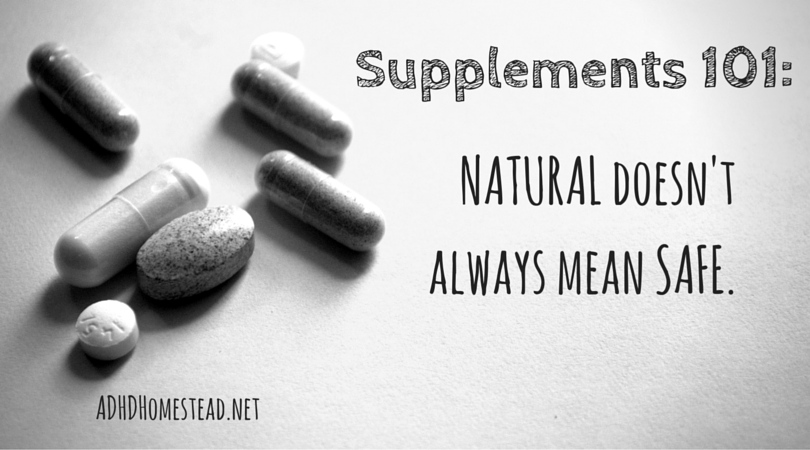Recently, I received a reader email asking about supplements and natural remedies for ADHD.
My short answer: buyer beware.
People have many reasons to try supplements: older adults may have concerns about taking stimulants with heart problems. Parents may yearn for an alternative to stimulant medications for their children.
Maybe supplements just feel more “natural.”
Natural they may be, but supplements aren’t necessarily safer or healthier than prescription drugs. Some may even be less safe.

Supplements: safety not guaranteed
The FDA treats drugs and supplements very differently. From aspirin to amoxicillin, medicines are vetted before hitting the market. Manufacturers must prove their drugs are not only safe, but effective for the conditions they claim to treat.
Compare that to the FDA’s treatment of supplements:
Although FDA has oversight of the dietary supplement industry, it is the supplement manufacturers and distributors that are responsible for making sure their products are safe before they’re marketed…FDA does not review supplements for effectiveness (as it does for prescription and OTC medications) before they enter the market. If the dietary supplement contains a new dietary ingredient, the manufacturer must submit for FDA’s review data on that ingredient’s safety—but not its effectiveness.
Vetting is up to the manufacturer, who profits from selling these products. But that’s okay because it’s natural, right?
Wrong.
“Natural” doesn’t always mean “safe.” Remember: arsenic, cyanide, and lead are natural substances, too. Consumers often mix and match supplements, unaware of how those substances will affect their unique body chemistry.
Getting too much of anything, even an essential nutrient, can harm your body. Some supplements will even alter the effectiveness of other medications.
If you’d like to learn more, the FDA provides a Dietary Supplements 101 overview on their website. NIH also offers guidance on using supplements wisely.
Big Pharma isn’t the only agenda in town
For all the conspiracy theories about “Big Pharma,” many consumers seem to trust supplement manufacturers implicitly. However, they’re also big businesses trying to make a profit. And they’re less accountable for the quality of what they sell.
We, as consumers, need to read everything with a skeptic’s eye. Where there’s money to be made, there’s often bias.
For example: I recommend Dr. Daniel Amen’s Healing ADD from the Inside Out to anyone interested in using supplements to help with ADHD. I also suggest reading with a grain of salt.
Dr. Amen is very knowledgeable and his book contains valuable insights. He’s also selling his own line of specialty supplements (among other things). It’s easy to read the literature and feel like the right combination of dietary supplements will solve all our problems.
Dr. Amen isn’t the only one to discover this niche. Sales of dietary supplements in the U.S. totaled over $30 billion last year. A savvy entrepreneur can put a line of supplements on the market quickly, without the research and development overhead of a drug manufacturer.
Are supplements a no go for ADHD?
Hop online or pick up Healing ADD and you’ll find plenty of anecdotal support for supplements. Maybe you’ll even discover they help ease your own symptoms. How we treat a chemical imbalance in our body is always up to us. I’ve written on this blog about my own experience taking a GABA supplement for migraines and mood swings.
However, we lack evidence that supplements can meet or exceed the effects of traditional ADHD medication for the average person. If something sounds too good to be true, it probably is.
As always, it’s important to look at where various messages are coming from, and who stands to profit from us believing what we read.
Have you tried supplements for ADHD? What was your experience?
Hey there! Are you enjoying The ADHD Homestead?
Here's the thing: I don't like ads. I don't want to sell your attention to an advertising service run by the world's biggest data mining company. I also value my integrity and my readers' trust above all, which means I accept very few sponsorships/partnerships.
So I'm asking for your support directly. For the cost of one cup of coffee, you can help keep this site unbiased and ad-free.
Below you will find two buttons. The first lets you join our crew of Patreon pals and pledge monthly support for my work. Patrons also have access to my Audioblogs podcast. The second takes you to a simple donation page to pledge one-time or recurring support for The ADHD Homestead, no frills, no strings. Do whichever feels best for you!

